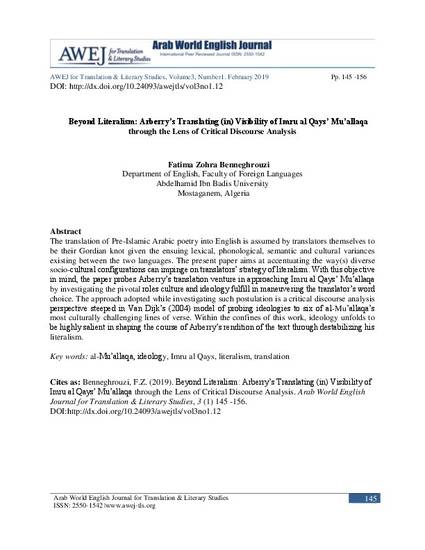
Article
Beyond Literalism: Arberry’s Translating (in) Visibility of Imru al Qays’ Mu’allaqa through the Lens of Critical Discourse Analysis
AWEJ for Translation & Literary Studies
(2019)
Abstract
The translation of Pre-Islamic Arabic poetry into English is assumed by translators themselves to be their Gordian knot given the ensuing lexical, phonological, semantic and cultural variances existing between the two languages. The present paper aims at accentuating the way(s) diverse socio-cultural configurations can impinge on translators’ strategy of literalism. With this objective in mind, the paper probes Arberry’s translation venture in approaching Imru al Qays’ Mu’allaqa by investigating the pivotal roles culture and ideology fulfill in maneuvering the translator’s word choice. The approach adopted while investigating such postulation is a critical discourse analysis perspective steeped in Van Dijk’s (2004) model of probing ideologies to six of al-Mu’allaqa’s most culturally challenging lines of verse. Within the confines of this work, ideology unfolds to be highly salient in shaping the course of Arberry’s rendition of the text through destabilizing his literalism.
Keywords
- al-Mu’allaqa,
- ideology,
- Imru al Qays,
- literalism,
- translation
Disciplines
Publication Date
Winter February 15, 2019
DOI
http://dx.doi.org/10.24093/awejtls/vol3no1.12
Citation Information
Fatima Zohra Benneghrouzi. "Beyond Literalism: Arberry’s Translating (in) Visibility of Imru al Qays’ Mu’allaqa through the Lens of Critical Discourse Analysis" AWEJ for Translation & Literary Studies Vol. 3 Iss. 1 (2019) p. 145 - 156 ISSN: 2550-1542 Available at: http://works.bepress.com/awejfortranslation-literarystudies/120/